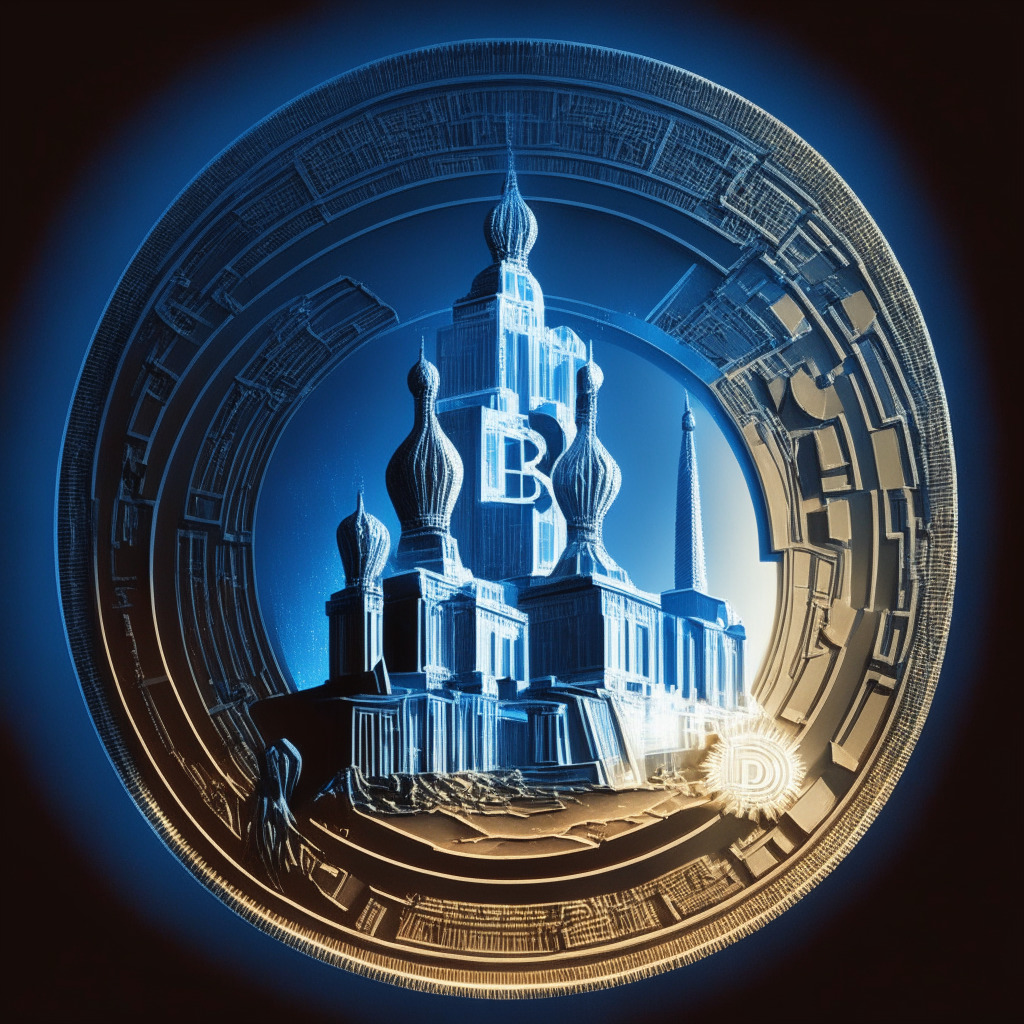Russian entrepreneurs aim to use “digital assets” and a “unified digital currency” for trade with BRICS and other nations. The idea of utilizing digital financial assets (DFAs), which may encompass digitized commodities, CBDCs, digital securities, cryptoassets, and stablecoins, in international payments is garnering attention. The possibility of creating a unified digital currency for cross-border transactions is also being evaluated.
Search Results for: central bank digital currency
How the Digital Yuan is Revolutionizing Gold Recycling and Real Estate Transactions in China
“China’s financial entities, local governmental bodies and businesses are gradually embracing the digital yuan, China’s Central Bank Digital Currency (CBDC), revolutionizing sectors from gold recycling to land registry fee payment. The gold recycling project powered by digital yuan and CBDC-powered land registry adoption in Fuqing highlights the acceleration of the digital yuan in various scenarios.”
Cross-Border CBDCs: A Look at Recent Trials and Cryptocurrency Platform Bankruptcies
“France, Singapore, and Switzerland recently experimented with cross-border Central Bank Digital Currencies (CBDCs) using public blockchain and DeFi technology in a venture named Project Mariana. Despite successful trials, further investigation and iterations are required to fully understand the complexities of implementing such systems.”
Navigating Uncharted Waters: Celsius and BlockFi’s Resolutions, Regulation Challenges & Brazil’s Digital Currency Leap
“Celsius Network’s valuation advisor, Stout Risius Ross, confirmed the accuracy of assets and liabilities’ valuation, setting a precedent in the crypto market. This follows a resolution that aligns cryptocurrency systems with traditional finance practices, demonstrating the maturing nature of the cryptocurrency sector.”
Tencent’s Alliance with PBoC: A Bold Move towards Digital Currency Dominance or a Risky Bet?
“Tencent, the operator of WeChat and WeChat Pay, is teaming up with the People’s Bank of China to promote the use of the digital yuan via Project mBridge. While this challenges the dominance of WeChat Pay and Alipay, the digital yuan is anticipated to complement rather than compete with these platforms. This venture signifies a technological revolution in payment systems, though its uncertainties remain to be explored.”
Hypothekarbank Lenzburg Navigates The Blockchain Wave: A Swiss Tale of Digital Assets & Risks
“Hypothekarbank Lenzburg, a Swiss bank with over $7 billion assets, has joined the Six Digital Exchange, becoming the sixth Swiss bank to do so. This move enables the bank to trade a variety of digital securities on a blockchain-oriented platform.”
Swiss Bank Joins Crypto Exchange – A Bold Leap or Risky Venture?
“Hypothekarbank Lenzburg, a Swiss bank with over $7 billion in assets, will join the Central Securities Depositary of SDX crypto exchange. This expands the bank’s role in digital assets including token issuance, digital value rights listings, and custody, bolstering its presence in the thriving crypto market.”
Navigating the Pros and Cons of a Prospective ‘Digital Euro’
The European Central Bank (ECB) discusses its ongoing development of a Central Bank Digital Currency (CBDC) – a digital Euro. The CBDC aims to offer a user-friendly, cost-free alternative to physical cash. Privacy protection, while preventing illegal activities, is emphasized as a fundamental aspect. However, potential creation and acceptance issues raise concerns, and the decision to move forward wouldn’t be decided until later in October.
Decoding Chainlink’s Multisig Wallet Controversy: Centralization Concerns Vs. Market Performance
Chainlink recently altered its multisig wallet’s signature rule, shifting from a 4-of-9 to a 4-of-8 requirement. Critics suggest this change and removal of a wallet address may indicate potential centralized control risking the DeFi ecosystem’s integrity. Regardless, Chainlink maintains its utility in DeFi projects and its token value keeps growing.
China’s Central Bank Stakes Digital Yuan’s Global Appeal: A Revolutionary Step or a Risky Leap?
China’s central bank has updated its official CBDC app to allow overseas visitors to purchase digital yuan tokens with foreign credit cards. The update reflects an unprecedented convenience, aiming to push the usage of mobile wallets of the CBDC, providing users with seamless online experiences, including refunds for any unused funds. This move widens the application of e-CNY, promoting its use for online financial exchanges on major platforms.
UnionBank Steps Into Crypto Arena: Landmark Move Towards Future-Ready Banking in Philippines
The Philippines’ Union Bank has become the first licensed bank in the country to serve as a virtual asset service provider, validated by the Bangko Sentral ng Pilipinas. Alongside, it’s introducing a feature for trading cryptocurrencies directly through its mobile app, marking a significant stride in digital banking transformation.
Battleground CBDC: A Bipartisan Struggle Shaping Cryptocurrency’s Future in the U.S.
The House Financial Services Committee introduced three bills halting the Federal Reserve’s considerations towards a Central Bank Digital Currency (CBDC). Republicans expressed fears over the potential impact on traditional banking and the suspense it could cast on the stablecoin market. Democrats, however, pushed for continued CBDC exploration, reminding of its potential benefits in global economic competition. The Federal Reserve reaffirmed its cautious approach towards CBDC, emphasizing concerns over a stablecoin issuance without federal control.
Traditional Finance Players Diving into Crypto: Progress or Path to Centralization?
“The recent trend of traditional finance players entering the cryptocurrency market has the potential to disrupt norms, increase flexibility, and power the underbanked. However, it also presents challenges, such as volatility, fraud, and security issues. Moreover, there’s a debate surrounding if this move could lead to centralization in an inherently decentralized space.”
Swift’s CBDC Connector: Revolutionizing Digital Currency Interaction and Challenging Traditional Norms
Swift, the global financial messaging network, has partnered with three central banks to beta test a cross-border transaction solution for CBDCs. The focus is on interoperability between different digital currencies and current fiat-based systems. Swift’s CBDC innovations are designed to prevent digital islands and establish safe links between existing and future payment systems.
Diving into Russia’s Digital Ruble Debate: Opportunity or Devastating Risk?
“Russia’s active consideration of a Central Bank Digital Currency (CBDC) is encountering challenges including potential rate increases and withdrawal of major backers. Despite concerns, observers remind that cautious innovation is needed as the future of money moves increasingly towards digitization.”
The Tug of War: The U.S.’s Potential Leap into Digital Currency vs Fears of Surveillance
The U.S. House of Representatives is considering the introduction of a Central Bank Digital Currency (CBDC), amidst contrasting views. Democrat Rep. Stephen Lynch calls for a pilot project for a digital dollar, stressing it is “absolutely critical” for the U.S. to show leadership in digital currency development. However, concerns remain regarding transaction management, tracking, and potential regulatory limitation issues.
Cryptocurrency’s Bold Advances & Legal Challenges: Analyzing Deutsche Bank, South Korean Bitcoin Lenders, EY.ai & More
“Deutsche Bank collaborates with Taurus, providing custody services for clients’ cryptocurrencies and tokenized assets. Meanwhile, Delio, a South Korean Bitcoin lender, contests fraud and embezzlement allegations, exposing lack of clear virtual asset regulations. Also, Ernst & Young unveils AI platform, and Mauve, a Decentralized Exchange, launches its operations.”
Trading Showdown: Forex vs Cryptocurrency – Stability or Innovation?
“Traditional forex trading involves trading fiat currency pairings, driven by worldwide financial hubs. Contrarily, cryptocurrency trading pertains to buying and selling digital currencies through exchanges, which introduces high volatility. Each market has unique advantages, risks, analysis methods, and strategies providing diverse opportunities.”
Unraveling the Future of a Decentralized Economy: Pros and Cons of Crypto Finance
“Bitcoin and decentralized finance (DeFi) offer a financial alternative to conventional systems, providing a solution to issues like inflation and institutional insolvency. However, challenges like Central Bank Digital Currencies (CBDCs), centralized exchanges, and global instability could impact DeFi’s potential benefits”
High-Profile Crypto Trial: Unveiling Legal Complexities and Fault-lines in the Digital Currency Sphere
“This landmark trial against the former FTX CEO, Sam Bankman-Fried, delves into deeper dialogues surrounding the volatile, yet promising world of cryptocurrency. Factors from jury comprehension of crypto trading to assertions of witness tampering indicate the case’s complexity. Notably, it spotlights how traditional jurisdictions significantly impact a decentralised sector.”
Unraveling the Complex Connection: Interest Rates and Cryptocurrency Volatility
“The U.S Treasury’s increased borrowing is causing speculation about the impact on digital asset prices. Investors may find Bitcoin appealing in a low interest rate regime, pushing up their prices. However, high conventional interest rates could have the opposite effect. Furthermore, fluctuations in interest rates can influence overall market sentiment, leading investors towards safe haven assets.”
CBDC Anti-Surveillance State Act: Preserving Financial Privacy in the Age of Digital Currencies
U.S. Representative Tom Emmer, with the support of 49 other Republican representatives, reintroduced the CBDC Anti-Surveillance State Act to prevent unjust financial surveillance through retail central bank digital currencies (CBDCs). Advocates contend such government-sanctioned currency must respect financial privacy, individual freedom, and market competitiveness.
The Digital Ruble: A Splash in the Global Financial Landscape or Russia’s Field to Plow?
“Russia’s Central Bank Digital Currency (CBDC) – the digital ruble – can play a significant role in curbing black market dollar trading, says former government official, Sergei Kalashnikov. It could minimize the chance of official currency entering the black market, adjust ruble’s value and impact dollar’s growth against it.”
Navigating the Future of Finance: Analyzing Project Sela’s Digital Currency Triumphs and Trials
“Israel and Hong Kong have completed their retail central bank digital currency (rCBDC) test runs, focusing on private participation, inclusivity, and security. Project Sela merges cash characteristics with digitization benefits, addressing policy, security, technology, and legal issues. However, real-time gross settlement (RTGS) system limitations and developmental challenges remain.”
Balancing Skepticism and Hope: Insights on the Crypto World from a Central Banker
“Sarah Breeden, the incoming deputy governor of the Bank of England, voices concern over potential financial instability posed by cryptocurrencies. While acknowledging the benefits of blockchain technology, she emphasizes the need for a global regulatory approach to manage cryptos’ volatility and potential economic implications. She sees value in a central bank digital currency as an anchor, while warning against potential privacy issues.”
Baltic Honeybadger: A Beacon for Privacy Advocates in the Age of Central Bank Digital Currencies
“The Riga-based cypherpunk reunion, the Baltic Honeybadger, focused on the importance of privacy, resistance against Central Bank Digital Currencies, and the Lightning Network. The event promoted deep, privacy-focused discussions while also featuring live Bitcoin games and participative fundraisers via the Lightning Network.”
Exploring the Probability of Marking Digital Ruble Tokens: A Double-Edged Sword for Russian CBDC
The Russian Central Bank potentially explores “marking” digital ruble tokens to track CBDC transactions, allowing close monitoring of funds usage. This suggests super-traceable tokens could be a reality soon, although there are cautionary notes around the required balance between regulation and autonomy in digital currency.
Fireblocks’ Non-Custodial Wallets: Shaping the Future of Digital Asset Control and Security
Cryptocurrency custody firm Fireblocks, in response to market leaders’ high-profile collapses, introduces a non-custodial wallet service, giving users control over their cryptographic keys. Adopting a fully non-custodial setup empowers users, bypasses regulatory restrictions and potentially revolutionizes fintech and blockchain technology’s future.
India’s Ambitious Plan: One Million CBDC Transactions by 2023 with Digital Rupee and UPI Integration
The Reserve Bank of India (RBI) is planning to increase daily retail Central Bank Digital Currency (CBDC) transactions from an average of 18,000 to one million by the end of 2023. RBI is also encouraging banks to facilitate e-rupee compatibility with Unified Payments Interface via QR codes for seamless transactions.
Navigating the Political Minefield of Central Bank Digital Currencies (CBDCs)
“Central bank digital currency (CBDC) enthusiasts face political opposition, despite the digital euro’s benefits such as EU-wide usability, unmatched privacy in digital payments, and independence from foreign payment providers. Opponents worry CBDCs could enable governmental overreach and surveillance, shifting discussions to the credibility of central banks. “
Navigating Digital Ruble Tokens: Russia’s Potential Game-Changer with Associated Risks
The Central Bank of Russia has limited digital ruble wallets to a maximum of 300,000 rubles per month to maintain market stability. However, suggestions have been made to remove this cap for non-Russian investors to facilitate foreign investment in Russia and simplify the purchase of Russian digital financial assets. This decision reflects the growing adoption of digital currencies globally.
Shaping Elections 2024: How Cryptocurrency Could Swing the Political Pendulum
“Crypto guru, Brian Armstrong, predicts that the exploding interest in crypto will turn it into a defining issue in the 2024 elections. As 56 million Americans already operate with digital currency, its potential implications are engaging presidential candidates. However, the quest for clear crypto regulation still looms, with opportunities for legislative clarity potentially arising from the Securities and Exchange Commission.”






























